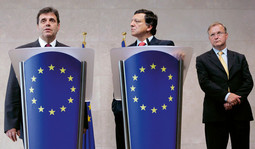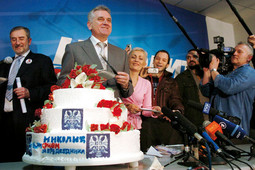Published in Nacional number 637, 2008-01-29
EUROPE AT A TURNING POINT
Serbia in the new Russian block
Regardless of the efforts of the signatories to stress that the agreement is economically motivated, its conclusion was influenced by politics
 GIVING IN TO INTERESTS The EU is ready to be lenient to Serbia regarding Kosovo to gain balance with Russia, but Serbian Premier Vojislav Kostunica is not giving up his stubborn manner; here photographed with Head of the European Commission José Manuel Barroso Since 1948, Belgrade has never been as close to Moscow as it is today. Since Josip Broz Tito turned his back to the former Soviet leader Joseph Vissarionovich Stalin in 1948, relations between Belgrade and Moscow have had their ups and downs over the past sixty years, but they reached their greatest level last week with the signing of an agreement which should confirm Russia’s status as a world energy power and assist in the economic and political strengthening of Serbia; Croatia could also be set to become part of that venture.
GIVING IN TO INTERESTS The EU is ready to be lenient to Serbia regarding Kosovo to gain balance with Russia, but Serbian Premier Vojislav Kostunica is not giving up his stubborn manner; here photographed with Head of the European Commission José Manuel Barroso Since 1948, Belgrade has never been as close to Moscow as it is today. Since Josip Broz Tito turned his back to the former Soviet leader Joseph Vissarionovich Stalin in 1948, relations between Belgrade and Moscow have had their ups and downs over the past sixty years, but they reached their greatest level last week with the signing of an agreement which should confirm Russia’s status as a world energy power and assist in the economic and political strengthening of Serbia; Croatia could also be set to become part of that venture.
The energy agreement between the governments of Serbia and Russia has an estimated value of €2 billion. It foresees that Belgrade should sell Russia 51% of the national oil company, Naftna industrija Srbije (NIS), for €400 million. Russia is obliged to invest a total of €500 million in NIS through the energy giant “Gazprom“ by 2012 and construct a part of the South Stream pipeline through Serbia.
The Russians have come to an agreement on the South Stream pipeline with Bulgaria and Serbia, but it is not certain which direction the pipeline will flow. It will apparently be known over the next two months whether the South Stream pipeline will flow through Croatia or Hungary to northern Italy. The South Stream pipeline is Moscow’s answer to the EU desire to decrease its energy dependency on Russia. It is estimated that the EU satisfies one-fourth of its needs through Russian natural gas. Bulgaria, Finland, Greece, Latvia, Lithuania and Slovakia depend 100% on Russian gas, which also satisfies 75% of the needs of Hungary and the Czech Republic, and two-thirds of needs of Poland and Romania.
70% of Russian gas enters the EU via the Ukraine, and the remainder comes via Belarus. The construction of the South Stream pipeline will create the conditions for an increase in Russian export to the EU, as well as the possibility to avoid transport of natural gas through the Ukraine, which does not have ideal political relations with Moscow.
Opinions in Serbia differ as to the benefits which Belgrade will receive from the agreement with Moscow. A majority of government representatives, as well as those from the opposition, and many Serbian and foreign experts, believe that it is a great deal which will bring numerous benefits to Serbia, such as stabile supply and the status of being an energy leader in the region. It is believed that Serbia, after securing Russian gas at a price lower than the market price because it will purchase directly from Gazprom manufacturers, will motivate companies from the petrochemical branch, plastics industry and pharmaceutical industry who are heavy users of natural gas, to expand to Serbia from other countries of Eastern Europe.
Those who oppose the Serbian-Russian agreement warn that Russia still has the possibility to start discussions at any point on the price of gas, which it has already done with its partners in the Ukraine, Moldova and Georgia which resulted in tensions in the relations between Moscow and the governments of those countries. Members from the Democratic Party run by Serbia’s President Boris Tadic, the Democratic Party of Serbia run by Vojislav Kostunica and New Serbia’s Infrastructural Minister, Velimir Ilic voted on the conclusion of the deal with the Russians. The seating was not attended by members of the government from the G17 Plus party, run by Economics Minister Mladjan Dinkic, one of the harshest critics of the agreement.
 TOMISLAV NIKOLIC Favoured radical in the second round of the presidential elections Dinkic said that the Russian offer was ˝humiliating for Serbia˝ and that Belgrade should proceed by the ˝Bulgarian fifty-fifty model˝, meaning that it should sell 50% of NIS in order to maintain management of the company. According to Dinkic, the price of 51% of NIS shares should not be less than €1.5 billion. In his argument, Dinkic pointed out that INA sold 25% of its shares for €525 million several years ago. Dinkic states that the €500 million to be invested in the modernization of refineries over four years is much less than the expected profit of NIS during the same period. These complaints, however, are accompanied by doubts in Belgrade that background behind Dinkic’s intentions is to fulfil the ˝promise˝ that Austria’s OMV will purchase NIS. However much the signatories of the agreement try to highlight that they are economically motivated, conclusion of the agreement was influenced by politics. The Russian ambassador in Belgrade, Aleksandar Aleksejev, estimates that this agreement will increase the political influence of Serbia in the region, which is especially important in the situation when Belgrade is fighting with all its might alongside its main ally, Moscow, against Kosovo’s independence.
TOMISLAV NIKOLIC Favoured radical in the second round of the presidential elections Dinkic said that the Russian offer was ˝humiliating for Serbia˝ and that Belgrade should proceed by the ˝Bulgarian fifty-fifty model˝, meaning that it should sell 50% of NIS in order to maintain management of the company. According to Dinkic, the price of 51% of NIS shares should not be less than €1.5 billion. In his argument, Dinkic pointed out that INA sold 25% of its shares for €525 million several years ago. Dinkic states that the €500 million to be invested in the modernization of refineries over four years is much less than the expected profit of NIS during the same period. These complaints, however, are accompanied by doubts in Belgrade that background behind Dinkic’s intentions is to fulfil the ˝promise˝ that Austria’s OMV will purchase NIS. However much the signatories of the agreement try to highlight that they are economically motivated, conclusion of the agreement was influenced by politics. The Russian ambassador in Belgrade, Aleksandar Aleksejev, estimates that this agreement will increase the political influence of Serbia in the region, which is especially important in the situation when Belgrade is fighting with all its might alongside its main ally, Moscow, against Kosovo’s independence.
The agreement has become a part of the competition between Tadic and the candidate from the Serbian Radical Party, Tomislav Nikolic, in the Serbian Presidential elections. Tadic travelled to Moscow to attend the signing of the agreement with Putin. Before that, Nikolic pleaded with Putin that he assist Serbia and sign an agreement with Kostunica and Tadic, pointing out that they will see that as a political victory. It can be heard in Belgrade, however, that the sale of the majority share of NIS for only €400 million will only be a good business move if Nikolic is victorious in the presidential elections, because then the EU will isolate Serbia.
What has Serbia sold to the Russians?
Alongside 51% ownership of the pipeline through Serbia, ˝Gazprom˝ receives NIS, a company with 12,000 employees and a 62% share in the Serbian market for petroleum derivatives. It also receives the refineries in Pancevo and Novi Sad, as well as 497 petrol stations. NIS is the owner of 10,000 square metres of office premises, as well as 11 hotels and rest areas.
Related articles
On vacation in Croatia: Three days on the Brijuni islands for Tadic's wife and children
Tanja Tadic, the wife of Serbian President Boris Tadic, and their two daughters Masa (12) and Vanja (9), vacationed recently on the Brijuni islands,… Više
Latest news
-
28.10.2010. / 14:15
'A profitable INA is in everyone's interest'
-
28.10.2010. / 09:38
Sanader’s eight fear SDP — Won’t bring down Government
-
21.10.2010. / 15:02
Interior Ministry turned a blind eye on Pukanic assassination
-
20.10.2010. / 09:34
Barisic could bankrupt HDZ




